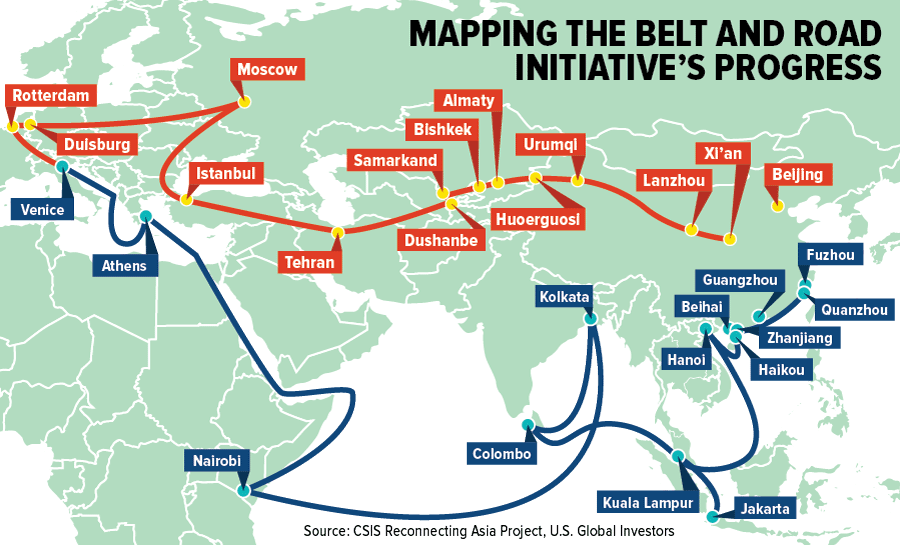
China has seen resilient cooperation with the Belt and Road (B&R) countries facing the impact of Covid-19, the country’s top economic planner said on Tuesday.
China has signed 201 B&R cooperation documents with 138 countries and 31 international organizations, Meng Wei, a spokesperson for the National Development and Reform Commission, said in a press conference.
In the first three quarters of the year, China’s trade with B&R countries totaled about US$963.4 billion and the country’s non-financial direct investment in these countries surged by 29.7% year-on-year to $13.02 billion, she said.
The China-Europe freight rail service network bucked up, with a total of 10,180 trips made as of November 5, said Meng, adding that nearly 8 million parcels of medical supplies have been delivered via the China-Europe freight trains this year.
Major B&R projects, including the China-Laos railway, China-Thailand railway, Jakarta-Bandung High-Speed Railway and Hungary-Serbia railway, are making positive headway, she added.
Since the outbreak of the pandemic, China has played its role as the world’s largest supplier of anti-pandemic goods, providing more than 280 batches of emergency materials to more than 150 countries and international organizations, Meng said.
Wuhan, capital of Hubei province, is making all-out efforts ranging from upgrading fever clinics to expanding epidemiological investigation forces to cope with any possible Covid-19 outbreaks during the winter, city authorities said Tuesday.
Health authorities in Wuhan, the city hit hardest by the Covid-19 epidemic in China earlier this year, have renovated fever clinics in 62 hospitals designated for Covid-19 treatment and have started building five infectious disease hospitals as part of efforts to guard against outbreaks this season, said Zheng Yun, deputy director of the city’s health commission.
Efforts are also underway to help healthcare institutions improve their ability to conduct nucleic acid testing for the novel coronavirus, and all secondary general hospitals and centers for disease control and prevention in the city will be capable of conducting such tests before the end of the year, he said.
Meanwhile, the city is establishing a professional epidemic prevention and control force comprising 1,000 members, including epidemiologists, testing technicians and virus sterilization workers, to ensure they can live up to their duties in case of an outbreak.
Medical institutions in the city have also expanded reserves of anti-epidemic materials to ensure 30-day supplies of personal protective equipment at each site, Zheng said.
China’s local government bond issuance reached 442.9 billion yuan ($67.35 billion) in October, data from the Ministry of Finance showed Tuesday.
The figure took the total local government bond issuance for the year to 6.12 trillion yuan by the end of last month. In the first 10 months, the issuance of new bonds amounted to 4.49 trillion yuan, accounting for 94.9% of the 4.73-trillion-yuan quota planned for the year, the data showed.
China has accelerated the issuance of local government bonds this year to facilitate the timely implementation of various projects in order to mitigate the impacts of the novel coronavirus outbreak.
DiDi, a ride-hailing app, now offers its “DiDi Express” and “DiDi Taxi” services in La Plata, the capital city of Argentina’s Buenos Aires Province, and in Greater Buenos Aires.
The launch in the city of Buenos Aires occurs after several months of work and analysis, in which the DiDi team identified local mobility needs and adapted its platform for launch in Argentina, the company said in a statement.
The company said five weeks ago, more than 15,000 taxi drivers and over 15,000 other drivers chose to join the application, and they would be able to start generating income independently and safely Tuesday. DiDi has more than 550 million users in 13 countries and has become a real alternative to entrepreneurship for more than 31 million driving partners.
cHuawei on Tuesday announced the arrival of Huawei Pay in Malaysia in partnership with UnionPay International and the Industrial and Commercial Bank of China (ICBC). The company said payments are now made easier and more secure in Malaysia by simply adding one’s bank cards to Huawei Pay, a mobile payment tool that provides contactless, cashless payment service for Huawei smartphone users.
According to the statement, ICBC (Malaysia) Bhd is the first financial institution in Malaysia to support Huawei Pay.
By Nadeem Xu on November 18 2020 for the Asia Times (Singapore)